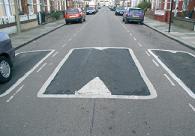Speed-bump, road hump, speed ramp or sleeping policemen. Let’s face it by any name they are the bane of urban driving (unless of course you make your living selling replacement shock absorbers). They’re a hassle, damage cars and cause urbanites to drive otherwise unnecessary 4x4s (in my experience anyway). Yes, average speeds are reduced, but so is your attention of what’s up ahead as you’re trying not to clout your exhaust on that unnecessary piece of road calming. Other complaints made against them are that they slow down emergency services (endangering lives), they are particularly unhealthy for people with back or neck pain and create noise for local residents.

But I can add another one, that they’re giving the poor Polar Bears an early bath. Yup, that speed bump round the corner on Mornington Close is directly responsible for the increasing popularity of bear-centric swimming lessons at the North Pole. So let me tell you how….
The AA (Automobile Association) did a bit of research on fuel consumption for cars at the Millbrook Proving Ground and found that a typical mid-size car running at a constant 30 mph did 58 mpg. However a car slowing down and speeding up for speed bumps only did 31 mpg. Put that into carbon figures* for a petrol car** and you get 113 g/km of CO2 at a constant 30mph, or 211 g/km over speed bumps. So a kilometer of road with speed bumps creates an extra 0.1kg of CO2 for every single car that travels it.
For argument’s sake, lets say this km of road has on a average a car going each way down it every minute during the day and night***. In a year, that means a single stretch of road creates an extra 103 tonnes of unnecessary CO2 per year. We’re making estimates here, but if that km of road has 10 of the UK’s estimated 100,000 speed humps, then speed bumps in Britain are responsible for a colossal 1.03 million tonnes of CO2 per year. That’s about the same as the total carbon footprint of the 830,000 residents of Fiji, or almost twice that of Greenland. Ouch.

You can console yourself that as a UK taxpayer, based on the estimate that 50 standard humps on three or four connecting residential streets costs about £150,000. So the UK speed hump population cost us £300 million pounds. Which is about what Newcastle United would cost you if you wondered up to St James’ Park with a really big chequebook this morning.
*Clear research
** A diesel car is actually worse with 128 v 240 g/km
*** More in the day and less at night of course
More information here.

